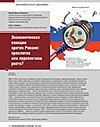Economic Sanctions Against Russia: Damnation of Decrease or Springboard for Free Flight?
2000s and 2010s are usually called “transition period”. On the one hand, during this time we observe the strengthening of the international cooperation actively being started with reforms under the rules of the G20 as the response to the intensification of global financial system’s development internal contradictions and the emergence of global economic crisis. On the other hand, these years are characterized by an increased level of conflicts manifested in the vigorous and collective application of sanctions and the declaration of trade wars. The subject of the article is especially relevant for Russia having been already sanctioned for 5 years. The purpose of this research is to analyze the impact of sanctions on the target economy. The paper provides a brief description of the existing sanctions against Russia since 2014. The second part of research is devoted to the identification of conditions for the effectiveness of economic sanctions. The third section includes the analysis of the negative sanction effect’s reasons and evidence. Finally we provide arguments in favor of real and potential opportunities for Russia to obtain economic benefits from the sanctions. In 2014–2016 we observed the negative effect of economic sanctions expressed in the form of losses and lost profits and caused as logical consequence of Russian economy’s development features. There are preconditions for creating a positive effect from sanctions — an impulse that can bring Russian economic system to a qualitatively new stage of growth. These positive trends need to be developed and sustained by domestic government support.



